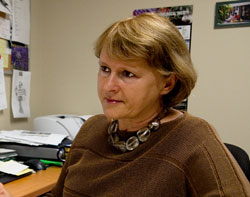Exercise is more than child’s play

Joanna Komorowski (Exercise Science) encourages overweight children to get active.
photo by rob maguire
Joanna Komorowski (Exercise Science) is really enjoying her current research project, as are her young subjects. “We play loud music, and they just have fun.”
Komorowski is collaborating with Laurent Legault at the Montreal Children’s Hospital (MCH) to look at the impact of resistance exercise training on metabolic dysregulation in obese children.
“This relationship has been studied in adults and the elderly,” but apart from a few analyses out of the U.S. and Korea, “very few people have systematically looked at resistance exercise in young children.”
The study involves kids aged eight to 12 who haven’t yet reached puberty. “We don’t want the hormones that impact body composition to be a factor,” she explained.
Childhood obesity is a good predictor for excess weight, and associated health problems (like Type II diabetes and cardiovascular disease) in adulthood. In Canada, approximately two in every five children aged two to 11 is considered overweight, with a body mass index, or BMI, in the 85th percentile for age. One in five is obese, with a BMI in the 95th percentile for age and body fat percentage of 35 and higher.
“Carrying that much extra weight around just makes it harder to move,” Komorowski said. “Their oxygen reserves deplete more rapidly, they get winded and then they get discouraged”— and in school gym class, often embarrassed. It’s not a very positive cycle.
Komorowski and her team of student coaches spent a good deal of time considering the problem and coming up with a program they believe can work. It’s a mixture of aerobic and resistance exercise, with little intervention in diet.
“Diet is very hard to control with young children,” she said. “They want to eat whatever their friends are eating.”
Subjects first attend a session at the MCH where their overall health, including insulin sensitivity, lipid profile, blood pressure and heart rate, is evaluated. Apart from excessive weight, they must be healthy and able to move around.
The same day, they make their first visit to the Exercise Science facilities. There they are scanned with a DEXA machine, which provides information about body composition. “They think it’s really cool,” said Komorowski. “The resulting printout provides a diagram of their skeleton and they love it.”
With the completion of the benchmarking tests, the children begin a 12-week exercise program. Twice each week for 75 minutes, they get individual coaching from Komorowski’s students. Sessions begin and end with light aerobic exercise, but centre on resistance training.
Resistance training focuses on building muscle mass, strength and endurance. Because it is anaerobic and involves limited movement, it is much easier for obese children.
“We use medicine balls, light weights, some machines, and they love it because they don’t get tired,” Komorowski said. The approach is a bit different from adult training, where maximal weight is used. “We go with a moderate weight at high repetition.”
Komorowski is excited about the preliminary results. The children rarely if ever miss a session. “We have extremely high compliance,” she said. “They gain strength, they see results, and they become encouraged.”
At the end of 12 weeks, benchmarking tests are redone to measure improvement. “We’re not necessarily expecting a reduction in body weight, but a change in body composition, with a decrease in body fat and some increase in muscle mass.” This combination is a known indicator of improvement in metabolic measures, such as insulin sensitivity.
While work on the current study will continue for the next nine to 12 months, Komorowski and her team already know how they are going to follow up.
“We’re seeing improved attitude and body image, “ she said. “When they feel stronger, they feel like doing more. We’re hearing from parents about more help carrying groceries.” Attitude is key to long-term success in weight control. In the next study Komorowski will look at motivation and behaviours, and involve a psychologist.
Children are still being accepted into the current study. Participants must be between eight and 12 years old and overweight. For more information contact Sabrina, (514) 412-4400, ext. 23534, or sabrina.diotalvi @muhc.mcgill.ca